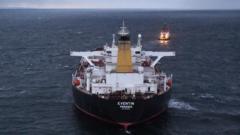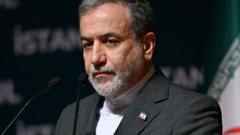German authorities have identified a stranded oil tanker, believed to belong to Russia's shadow fleet, as a threat to European security amid ongoing sanctions.
Germany Identifies Russian Oil Tanker as Part of 'Shadow Fleet'

Germany Identifies Russian Oil Tanker as Part of 'Shadow Fleet'
Oil tanker Eventin, flagged in Panama, becomes a focal point in sanctions evasion debate amid rising geopolitical tensions.
The Eventin oil tanker, which lost power and steering while drifting in the Baltic Sea, has drawn attention from German maritime authorities, who are using tugboats for a rescue operation. Flagged in Panama, the vessel is under scrutiny due to its ties to Russia, which German Foreign Minister Annalena Baerbock accuses of attempting to evade international sanctions imposed following the invasion of Ukraine in 2022.
The oil tanker, measuring approximately 274 meters in length and carrying about 99,000 tonnes of oil, was found in the coastal waters north of the German island of Rügen. In a statement, Baerbock criticized Russian President Vladimir Putin for allegedly employing a "rusty fleet" to circumvent sanctions. The situation has prompted Germany to take necessary safety precautions due to challenging sea conditions, with waves reaching up to 2.5 meters high.
Reports also highlight that Germany, aided by specialized rescue teams, is transporting the stranded vessel with three tugboats. Thankfully, no oil leaks have been detected so far.
The discussion surrounding the shadow fleet has gained traction in light of the European Union's ongoing efforts to combat Russia's oil industry. Last December, the EU mentioned the need for sanctions to address the security risks posed by these obscure vessels.
The increased scrutiny and sanctions against Russian oil companies, such as Gazprom Neft and Surgutneftegas, have been described by UK Foreign Secretary David Lammy as measures to sap Russia's war funding potential, indirectly aiding Ukraine in the process. However, Gazprom Neft has criticized these sanctions, calling them "baseless" and "illegitimate."
As the conundrum regarding Russia's shadow fleet unfolds, the U.S. Department of the Treasury has also sanctioned 183 vessels linked to this phenomenon, highlighting the complexities surrounding maritime regulations and ownership in the face of international scrutiny.
The Eventin incident is a vivid flashpoint demonstrating the interplay of maritime issues, geopolitical tensions, and the ongoing struggle over energy resources in Europe.
The oil tanker, measuring approximately 274 meters in length and carrying about 99,000 tonnes of oil, was found in the coastal waters north of the German island of Rügen. In a statement, Baerbock criticized Russian President Vladimir Putin for allegedly employing a "rusty fleet" to circumvent sanctions. The situation has prompted Germany to take necessary safety precautions due to challenging sea conditions, with waves reaching up to 2.5 meters high.
Reports also highlight that Germany, aided by specialized rescue teams, is transporting the stranded vessel with three tugboats. Thankfully, no oil leaks have been detected so far.
The discussion surrounding the shadow fleet has gained traction in light of the European Union's ongoing efforts to combat Russia's oil industry. Last December, the EU mentioned the need for sanctions to address the security risks posed by these obscure vessels.
The increased scrutiny and sanctions against Russian oil companies, such as Gazprom Neft and Surgutneftegas, have been described by UK Foreign Secretary David Lammy as measures to sap Russia's war funding potential, indirectly aiding Ukraine in the process. However, Gazprom Neft has criticized these sanctions, calling them "baseless" and "illegitimate."
As the conundrum regarding Russia's shadow fleet unfolds, the U.S. Department of the Treasury has also sanctioned 183 vessels linked to this phenomenon, highlighting the complexities surrounding maritime regulations and ownership in the face of international scrutiny.
The Eventin incident is a vivid flashpoint demonstrating the interplay of maritime issues, geopolitical tensions, and the ongoing struggle over energy resources in Europe.



















